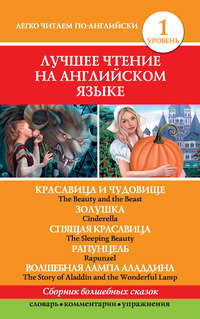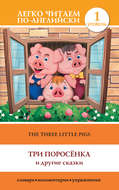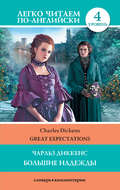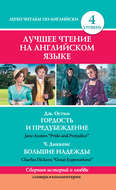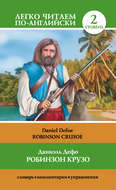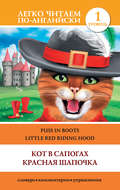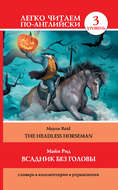Read the book: «Красавица и чудовище. Золушка. Спящая красавица. Рапунцель. Волшебная лампа Аладдина / The Beauty and the Beast. Cinderella. The Sleeping Beauty. Rapunzel. The Story of Aladdin and the Wonderful Lamp»
Иллюстрации И. В. Кульбицкой, М. М. Салтыкова
© ООО «Издательство АСТ», 2014
Предисловие
Сказка, повествуя о волшебстве и чудесах, вплетенных в реальность, сопровождает нас с самого раннего детства. Захватывая наше воображение, она становится нашим наставником и проводником в запутанных лабиринтах жизни. Сказка учит нас общению с другими людьми, обращению с животными, она помогает нам отличить добро от зла, полезное от вредного, раскрывает перед нами удивительные свойства природы.
Войдя в наше детство, сказка не уходит от нас и тогда, когда мы становимся взрослыми. Читая сказки своим детям, взрослые снова и снова погружаются в сказочный мир, находя в нем столь необходимое для души отвлечение от забот, неудач и горестей, возрождение надежды и веру в счастливый конец.
Все эти замечательные особенности сказки превращают ее в уникальный текстовой материал при обучении иностранному языку. Погружаясь в текст сказки, мы, сами того не замечая, лучше усваиваем иностранные слова, а нравственно-воспитательный аспект сказки дает отличную почву для обсуждения текста произведения на занятиях в группе.
Сюжеты вошедших в предлагаемый сборник сказок хорошо известны читателю, что значительно упростит понимание текста, поэтому книга может быть рекомендована тем, кто не так давно начал изучать английский язык. Наиболее трудные для понимания выражения объясняются в комментариях, а помещенные после каждой сказки словарики помогают усвоить незнакомую лексику.
Красавица и чудовище
The Beauty and The Beast
Адаптация текста, упражнения, комментарии и словарь Д. Л. Абрагина
1
There was once a very rich merchant, who had six children, three sons, and three daughters. His daughters were extremely beautiful, especially the youngest. When she was little everybody admired her, and called her “The little Beauty;” so that, as she grew up, she still went by the name of Beauty,1 which made her sisters very jealous.
The youngest, as she was the most beautiful, was also better than her sisters. The two eldest had a great deal of pride, because they were rich. They went out every day to parties, balls, plays, concerts, and so forth, and they laughed at their youngest sister, because she spent the greatest part of her time in reading good books.
As it was known that they were great fortunes,2 several eminent merchants proposed them; but the two eldest said, they would never marry, unless they could meet with a duke, or an earl at least. Beauty very civilly thanked them that courted her, and told them she was too young yet to marry, but chose to stay with her father a few years longer.
All at once3 the merchant lost his whole fortune, excepting a small country house at a great distance from town, and told his children with tears in his eyes, they must go there and work for their living. The two eldest answered, that they would not leave the town, for they had several lovers, who they were sure would be glad to have them, though they had no fortune;4 but the good ladies were mistaken, for their lovers slighted and forsook them in their poverty. As they were not beloved because of their pride, everybody said “they do not deserve to be pitied”. “But”, added they, “we are extremely concerned for Beauty, she was such a charming, sweet-tempered creature, spoke so kindly to poor people, and was of such an affable, obliging behaviour. Nay, several gentlemen were ready to marry her, though they knew she had not a penny; but she told them she could not think of leaving her poor father in his misfortunes, but was determined to go along with him into the country to comfort and attend him. Poor Beauty at first was sadly grieved at the loss of her fortune;5 “but,” said she to herself, “I must try to make myself happy without a fortune.”
Exercises
1. Translate into Russian:
merchant, to admire, jealous, pride, fortune, eminent, to propose, to marry, duke, earl, civilly, to court, excepting, poverty, to deserve, extremely, misfortune.
2. Answer the questions.
1. How many children did the merchant have?
2. Were the merchant’s daughters beautiful?
3. What was the youngest daughter called?
4. Where did the eldest sisters everyday go out?
5. How did the youngest sister spend the greatest part of her time?
6. Who proposed the sisters?
7. What happened to the merchant all at once?
8. What did people say about Beauty and her sisters?
9. Did anybody want to marry Beauty?
10. What did Beauty decide?
3. True or False?
1. The merchant had seven children.
2. The youngest daughter was the ugliest.
3. The two eldest daughters had a great deal of pride, because they were rich.
4. One day Beauty decided to marry an eminent merchant.
5. All at once the merchant lost his whole fortune.
6. The eldest sisters were not beloved because of their pride.
7. Nobody was concerned for Beauty.
8. Several gentlemen were ready to marry Beauty, though they knew she had not a penny.
4. Insert the right prepositions (at, to).
1. They went out every day __________ parties, balls, plays, concerts, and so forth.
2. They laughed __________ their youngest sister, because she spent the greatest part of her time reading good books.
3. The merchant lost his whole fortune, excepting a small country house ___ a great distance from town.
Beauty spoke kindly __________ poor people.
2
When they came to their country house, the merchant and his three sons applied themselves to husbandry and tillage;6 and Beauty rose at four in the morning, and made haste to clean the house and cook dinner for the family. In the beginning she found it very difficult, for she had not been used to work as a servant, but in less than two months she grew stronger and healthier than ever. After she had done her work, she read, played the piano, or sung while she spun.
On the contrary, her two sisters did not know how to spend their time; they got up at ten, and did nothing but wander about the whole day, lamenting the loss of their fine clothes and acquaintance. “Look at our youngest sister,” said they, one to the other, “what a poor, stupid, mean-spirited creature she is, to be contented with such an unhappy situation.”
The good merchant was of quite a different opinion; he knew very well that Beauty was better than her sisters, in her person as well as her mind, and admired her humility, industry and patience; for her sisters not only left her all the work of the house to do, but insulted her every moment.
The family had lived about a year in this retirement, when the merchant received a letter with an account that a vessel, on board of which he had some goods, safely arrived. This news made the two eldest daughters happy and they immediately flattered themselves with the hopes of returning to town,7 for they were quite weary of a country life; and when they saw their father ready to set out, they begged of him to buy them new dresses, ribbons, and other trifles; but Beauty asked for nothing for she thought, that all the money her father was going to receive, would not be sufficient to purchase everything her sisters wanted.
“What will you have, Beauty?” said her father.
“Since you have the goodness to think of me,8” answered she, “be so kind to bring me a rose, for as none grows hereabouts, they are a kind of rarity.”

The merchant went on his journey, but when he came there, they went to law with him about the merchandise9, and after a great deal of trouble and pains to no purpose,10 he came back as poor as before.
He was not far from his own house, thinking on the pleasure he should have in seeing his children again, when going through a large forest he lost himself.11 It rained and snowed terribly; and the wind was so high, that it threw him twice off his horse,12 and he heard wolves’ howling all round him. Suddenly he saw a light at some distance. It came from a palace illuminated from top to bottom. The merchant thanked God for this happy discovery, and hastened to the place, but was greatly surprised at not meeting with anyone in the outer courts. His horse followed him, and seeing a large stable open, went in, and finding both hay and oats, the poor beast, who was almost famished, started to eat greedily. The merchant tied him up to the manger, and walked towards the house, where he saw no one. Entering into a large hall, he found a good fire, and a table plentifully set out with but one cover laid.13 As he was wet quite through with the rain and snow, he drew near the fire14 to dry himself. “I hope,” said he, “the master of the house, or his servants will excuse the liberty I take; I suppose it will not be long before some of them appear.”

Exercises
1. Translate into Russian:
husbandry, tillage, to lament, contented, industry, patience, to insult, vessel, weary, trifles, to purchase, rarity, journey, merchandise, howling, top, bottom, discovery, stable, hay, greedily, to dry oneself, liberty.
2. Answer the questions.
1. What did Beauty do in the morning?
2. How did Beauty’s sisters spend their time?
3. What did they say about Beauty?
4. What did the merchant think about Beauty?
5. What letter did the merchant receive one day?
6. What did Beauty’s sisters beg the merchant to buy?
7. Why did Beauty ask her father to bring her a rose?
8. What happened to the merchant on his way back home?
9. What did the merchant find entering a large hall?
10. What did the merchant think about the master and his servants?
3. True or False?
1. Beauty rose at four in the morning, and made haste to clean the house and cook dinner for the family.
2. After she had done her work, she played the guitar or met with her friends.
3. Beauty’s sisters usually helped her to cook dinner.
4. The merchant knew very well that Beauty was better than her sisters.
5. One day the merchant received a letter with an account that a vessel, on board of which he had some goods, safely arrived.
6. Beauty asked the merchant to bring her some jewelry.
7. Going through a large forest the merchant found a beautiful castle and entered it.
8. Entering a large hall the merchant saw the master of the house.
4. Insert the right prepositions (for, from, with, to).
1. When they came ________ their country house, the merchant and his three sons applied themselves to husbandry and tillage.
2. Beauty rose at four in the morning, and made haste to clean the house and cook dinner ________ the family.
3. The merchant received a letter ________ an account that a vessel, on board of which he had some goods, safely arrived.
4. It came ________ a palace illuminated from top to bottom.
3
He waited a considerable time, until it struck eleven, and still nobody came. At last he was so hungry that he could stay no longer, but took a chicken, and ate it in two mouthfuls. After this he drank a few glasses of wine, and growing more courageous he went out of the hall, and crossed through several grand apartments with magnificent furniture, until he came into a chamber, which had an exceeding good bed in it, and as he was very much fatigued, and it was past midnight, he decided it was best to shut the door, and go to bed.
It was ten the next morning before the merchant waked, and as he was going to rise he was astonished to see a good suit of clothes in the room of his own; certainly, said he, this palace belongs to some kind fairy, who has seen and pitied my distress. He looked through a window, but instead of snow saw the most delightful arbours and beautiful flowers. He then returned to the great hall, where he had taken supper the night before, and found some chocolate on a little table. “Thank you, good Madam Fairy,15” said he aloud, “for being so careful, as to provide me a breakfast; I am extremely obliged to you for all your favours.16”
The good man ate the chocolate, and then went to look for his horse, but passing through an arbour of roses he remembered Beauty’s request to him, and gathered a branch with several flowers; immediately he heard a great noise, and saw such a frightful Beast coming towards him, that he was ready to faint away.
“You are very ungrateful,” said the Beast to him, in a terrible voice; “I have saved your life by receiving you into my castle, and, in return, you steal my roses, which I value beyond any thing in the universe, but you shall die for it; I give you just a quarter of an hour to prepare yourself, and say your prayers.17”
The merchant fell on his knees, and lifted up both his hands, “My lord,” said he, “I beseech you to forgive me, indeed I had no intention to offend in gathering a rose for one of my daughters, who desired me to bring her one.”
“My name is not My Lord,” replied the monster, “but Beast; I don’t love compliments. I like people to speak as they think; and so do not imagine, I am to be moved by any of your flattering speeches.18 But you say you have got daughters. I will forgive you, on condition that one of them come willingly, and suffer for you. Go and swear that if your daughter refuse to die instead of you, you will return within three months.”
Exercises
1. Translate into Russian:
magnificent, chamber, astonished, fairy, distress, to provide, request, to gather, frightful, ungrateful, to steal, to value, intention, on condition, willingly, to swear, within.
2. Answer the questions.
1. What did the merchant eat and drink?
2. Where did the merchant go after supper?
3. When did the merchant wake the next morning?
4. What did he see in the room of his own?
5. What did he see looking through the window?
6. What did the merchant remember passing through an arbour of roses?
7. Was the merchant frightened when he saw the Beast? Why?
8. What did the Beast say to the merchant?
9. Why was the Beast angry?
10. Was the Beast ready to forgive the merchant?
3. Insert the right prepositions (for, in, through).
1. The merchant crossed ___________ several grand apartments with magnificent furniture.
2. He looked ___________ a window but instead of snow saw the most delightful arbours and beautiful flowers.
3. He was astonished to see a good suit of clothes ___________ the room of his own.
4. I will forgive you, on condition that one of your daughters come willingly, and suffer ___________ you.
4. Complete the sentences using the words from the box.

1. Growing more courageous he went out of the hall, and ______________ through several grand apartments with magnificent furniture.
2. He was astonished to see a good ______________ in the room of his own.
3. Instead of snow he saw the most delightful ______________ and beautiful flowers.
4. Passing through an arbour of roses he remembered Beauty’s request to him, and gathered ______________ with several flowers.
5. I have saved your life by receiving you into my castle, and, in return, you ______________ my roses, which I value beyond any thing in the universe.
6. I give you just a quarter of an hour _________________________.
7. I had no ______________ to offend in gathering a rose for one of my daughters, who desired me to bring her one.
8. I will forgive you, on condition that one of them come ______________, and suffer for you.
4
The merchant had no mind19 to sacrifice his daughters to the ugly monster, but he thought, in obtaining this respite, he should have the satisfaction of seeing them once more, so he promised, upon oath,20 he would return, and the Beast told him he might set out when he pleased, “but,” added he, “you shall not depart empty-handed; go back to the room where you lay, and you will see a great empty chest; fill it with whatever you like best, and I will send it to your home,” and at the same time Beast withdrew.
“Well,” said the good man to himself, “if I must die, I shall have the comfort, at least, of leaving something to my poor children.” He returned to the bedchamber, and finding a great quantity of gold, he filled the great chest the Beast had mentioned, locked it, and afterwards took his horse out of the stable, leaving the palace with as much grief as he had entered it with joy. The horse took one of the roads of the forest, and in a few hours the good man was at home.
His children came round him, but instead of receiving their embraces with pleasure, he looked on them, and holding up the branch he had in his hands, he burst into tears.21 “Here, Beauty,” said he, “take these roses, but little do you think how dear they are like to cost your unhappy father,” and then told them about his unhappy adventure. Immediately the two eldest daughters started to cry and said all manner of ill-natured things22 to Beauty, who did not cry at all.
“Do but see the pride of that little wretch,” said they; “she would not ask for fine clothes, as we did; but she wanted to distinguish herself,23 so now she will be the death of our poor father, and yet she does not so much as shed a tear.24”
“Why should I,” answered Beauty, “it would be very needless, for my father shall not suffer upon my account,25 since the monster will accept one of his daughters, and I am very happy in thinking that my death will save my father’s life, and be a proof of my tender love for him.”
“No, sister,” said her three brothers, “that shall not be, we will go and find the monster, and either kill him, or perish in the attempt.26”
“Do not imagine any such thing, my sons,” said the merchant, “Beast’s power is so great, that I have no hopes of your overcoming him. I am charmed with Beauty’s kind and generous offer, but I cannot yield to it. I am old, and have not long to live.”
“Indeed father,” said Beauty, “you shall not go to the palace without me, you cannot hinder me from following you.” It was to no purpose all they could say. Beauty still insisted on setting out for the fine palace, and her sisters were delighted at it, for her virtue and amiable qualities made them envious and jealous.
The merchant was so afflicted at the thoughts of losing his daughter, that he had quite forgot the chest full of gold, but at night when he retired to rest,27 no sooner had he shut his chamber door, than, to his great astonishment,28 he found it by his bedside; he was determined, however, not to tell his children, that he was grown rich, because they would have wanted to return to town, and he was resolved not to leave the country; but the Beauty informed him, that two gentlemen came in his absence,29 and courted her sisters. She begged her father to consent to their marriage, and give them fortunes, for she was so good, that she loved them and forgave heartily their behaviour. These wicked creatures rubbed their eyes with an onion to force some tears30 when they parted with their sister, but her brothers were really concerned.
The free sample has ended.
